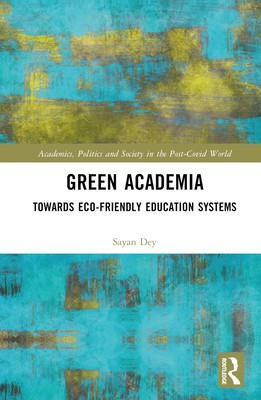
- We will send in 10–14 business days.
- Author: Sayan Dey
- Publisher: Routledge Chapman & Hall
- ISBN-10: 1032126043
- ISBN-13: 9781032126043
- Format: 15.6 x 23.4 x 1 cm, hardcover
- Language: English
- SAVE -10% with code: EXTRA
Reviews
Description
This book studies the importance of adopting Green Academia as a systemic long-term counter-intervention strategy against any form of impending pandemics in the post-COVID era and beyond. It argues that anti-nature and capitalistic knowledge systems have contributed to the evolution and growth of COVID-19 across the globe and emphasizes the merits of reinstating nature-based and environment-friendly pedagogical and curricular infrastructures in mainstream educational institutions. The volume also explores possible ways of weaving ecology and the environment as a habitual practice of teaching and learning in an intersectional manner with Science and Technology Studies. With detailed case studies of the green schools in Bhutan and similar practices in India, Kenya, and New Zealand, the book argues for different forms of eco-friendly education systems and the possibilities of expanding these local practices to a global stage.
Part of the Academics, Politics and Society in the Post-COVID World series, this book will be an essential read for scholars and researchers of sociology, cultural studies, decolonial studies, education, ecology, public policy social anthropology, sustainable development, sociology of education, and political sociology.
EXTRA 10 % discount with code: EXTRA
The promotion ends in 14d.20:37:44
The discount code is valid when purchasing from 10 €. Discounts do not stack.
- Author: Sayan Dey
- Publisher: Routledge Chapman & Hall
- ISBN-10: 1032126043
- ISBN-13: 9781032126043
- Format: 15.6 x 23.4 x 1 cm, hardcover
- Language: English English
This book studies the importance of adopting Green Academia as a systemic long-term counter-intervention strategy against any form of impending pandemics in the post-COVID era and beyond. It argues that anti-nature and capitalistic knowledge systems have contributed to the evolution and growth of COVID-19 across the globe and emphasizes the merits of reinstating nature-based and environment-friendly pedagogical and curricular infrastructures in mainstream educational institutions. The volume also explores possible ways of weaving ecology and the environment as a habitual practice of teaching and learning in an intersectional manner with Science and Technology Studies. With detailed case studies of the green schools in Bhutan and similar practices in India, Kenya, and New Zealand, the book argues for different forms of eco-friendly education systems and the possibilities of expanding these local practices to a global stage.
Part of the Academics, Politics and Society in the Post-COVID World series, this book will be an essential read for scholars and researchers of sociology, cultural studies, decolonial studies, education, ecology, public policy social anthropology, sustainable development, sociology of education, and political sociology.


Reviews